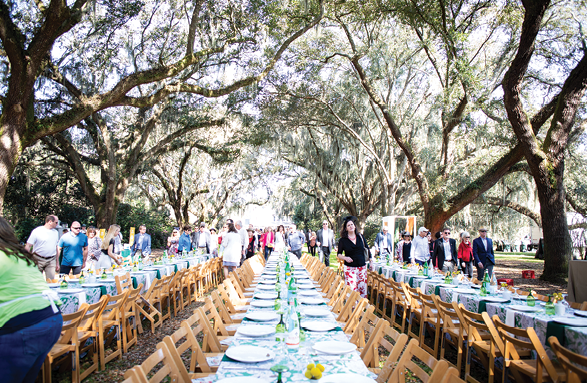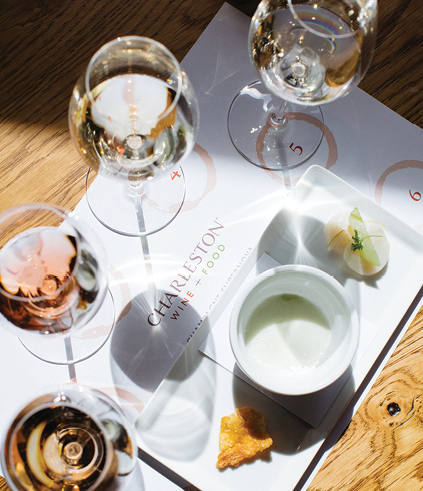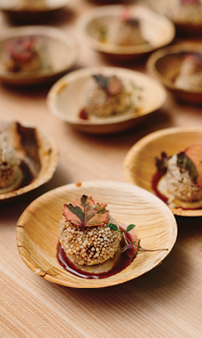- Home
- Media Kit
- Current Issue
- Past Issues
- Ad Specs-Submission
- Ad Print Settings
- Reprints (PDF)
- Photo Specifications (PDF)
- Contact Us

![]()
ONLINE

A Culinary and Hospitality Community
Editors’ Note
Gillian Zettler assumed her current role in 2013 after having served as the Executive Director of euphoria, a multi-day food, wine and music event in Greenville, South Carolina, for almost three years. Prior to this, she served as Event Manager for The Children’s Museum of the Upstate, also in Greenville. Zettler held multiple positions at Entercom Communications Corporation after graduating with a B.A. in education from Clemson University.
Organization Brief
Charleston Wine + Food (charlestonwineandfood.com) is a 501(c)(3) non-profit organization that supports Charleston and the Lowcountry’s diverse culinary and hospitality community. It champions the region’s unique foodways 365 days a year through world-renowned culinary experiences that bring people together to share stories and create connections.

Arriving at the Charleston Wine + Food gospel brunch
Will you highlight Charleston Wine + Food and how the organization has evolved?
I think that there’s been a huge evolution since I took the reins in Charleston. One of the things that I’m most proud of is how we’ve turned the corner of becoming – and it’s actually part of this year’s advertising campaign – more than a wine and food festival. At this point, you can look across the United States and find a food event of some sort in virtually every major city, and Charleston’s no different. We’ve obviously had the great opportunity to be able to shine a light on this amazing hospitality and culinary community that we have, but with the festival’s maturation and growth over the past five years, we’ve been able to step outside of that food festival box and really become a content generator. There is nothing more exciting to me than being able to share amazing stories through the festival and shine a light on all the beautiful people and places that make Charleston so special.
How do you define the market for the Festival?
We end up with about a 50/50 split of local and non-local attendees, with non-locals being defined as people who are more than 50 miles away. There is definitely a hot spot in the Georgia and North Carolina market, but it extends beyond those to areas with direct fly markets to Charleston. We see a huge guest population from New York, Boston, Texas, Florida, and even California. We have a really elevated food scene for the size of our city, and our community knows how to make you feel welcome.

Champagne tasting flight
How important has it been to build the right team as the Festival has grown?
I could talk all day about the strength of my team. It is the reason that I show up for work every day. We have a motto that is pasted on the walls of our office that says, “Patience, gentleness, and kindness.” My team knows that that’s my mantra, and I certainly look to hire for soft skills. I value empathy, flexibility, and gentle delivery of information. I think that especially in the event world, there is this “it’s got to get done” attitude, and sometimes that translates to abrasive communication when it doesn’t need to be. I’m always telling the team that you can communicate in a way that is kind and that is patient, and I think that a great portion of our success comes not only from treating each other that way, but also by extending that ethos to our external relationships and our communication.
Will you discuss the economic impact of the Festival?
I give a lot of credit to the people that initially founded the festival who saw the importance and the alignment with the College of Charleston and working with the Office of Tourism Analysis to do an economic impact study right out of the gate. It is important to be able to track our guests’ length of stay. Trips hovered around two nights six or seven years ago, but are now eking up to a five night average stay, which has grown in tandem with the length of the festival which started at two days and is now five days long. The economic impact formula is driven by heads in beds, but then there’s this huge ripple effect that comes as well. We hear from local businesses that restaurants and retail stores are seeing increased traffic. The festival had an $18.6 million economic impact in 2019, which is remarkable for a five-day event.

A dish served opening night
As a 501(c)(3), will you highlight the charity component to the Festival?
The festival is a 501(c)(3) organization and was founded in 2006. The main reason for the festival was to shine a light on the culinary and hospitality community and be an economic impact driver for the city. The piece that walks in tandem to that is being able to give back. We’ve been really excited over the past few years to work closely with One80 Place and its training program. One80 Place Training is a rapid-fire, five-week culinary crash course that ultimately prepares folks who come through the program to step into a kitchen and hopefully begin a career in the culinary industry. We actually moved one of our outside commissary kitchens that we used for all the food prep during the festival into One80 Place last year. Many chefs thought this was a really bold move to have some of the best chefs in the country prepping their food in a homeless shelter. I think it is humbling to give people an up-close view not only of all that goes into having to prepare meals for hundreds of people each day, but also how blessed we all are to have the things that we need on a day-to-day basis.
How do you describe Charleston today and what makes it special?
There is this sense of welcome to being in Charleston. Charleston is a southern city with a very complicated and sometimes very sad history. I think one thing that we, as an entity planning events in a city with a historical backdrop, are constantly looking for is ways to acknowledge our past and embrace our community as a whole. One of the major themes for the festival this year as we developed programming was this idea of migrations of people and ingredients. We want to make sure that when we’re celebrating something like shrimp and grits, that we’re also being true to how the shrimp and grits landed on the plate. How did those ingredients get to Charleston and who brought them here? We can pay homage to the history of Charleston and acknowledge our past while simultaneously celebrating the beautiful city that we have become.![]()